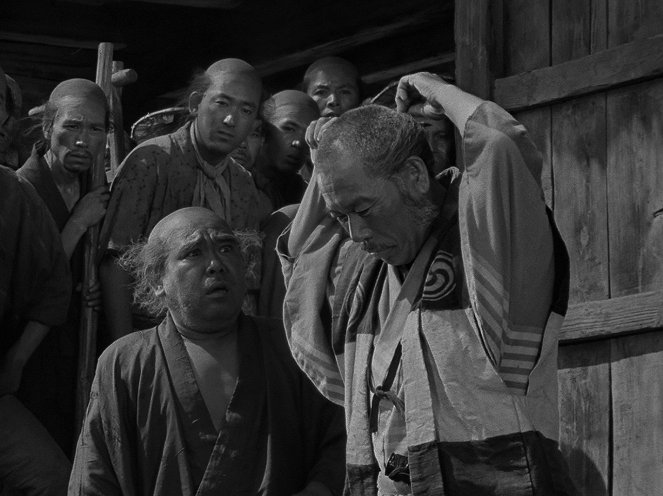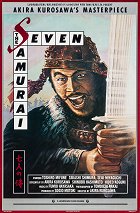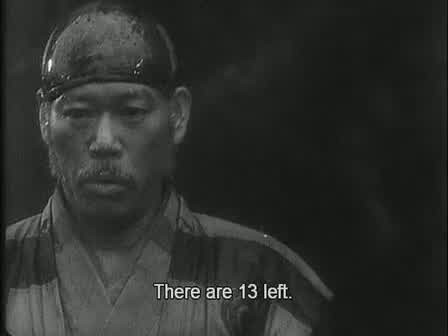Directed by:
黒澤明Cinematography:
Asakazu NakaiComposer:
Fumio HayasakaCast:
Takashi Shimura, Daisuke Katō, Minoru Chiaki, Isao Kimura, Seiji Miyaguchi, Toshirō Mifune, Kamatari Fujiwara, Atsushi Watanabe, Isao Yamagata, Reiko Mori (more)VOD (3)
Plots(1)
Set in 16th Century Japan, Akira Kurosawa's epic Seven Samurai follows the plight of a defenseless farming village that lives in constant fear of marauding bandits. The farmers know that when their crops are harvested, the thugs will attack, so four men go to town in hopes of employing samurai to fight for them. However, the poor villagers can merely offer payment in the form of shelter and a daily bowl of rice, and initially only Kambei (Takashi Shimura), a brave elder samurai, and his eager young apprentice, Katsushiro (Isao Kimura), take up their cause. Encountering various nomadic warriors on the streets, they slowly put together his team of swordsmen, recruiting Shichiroji (Daisuke Katô), Gorobei (Yoshio Inaba), Heihachi (Minoru Chiaki), and Kyuzo (Seiji Miyaguchi). Finally, Kikuchiyo (Toshirô Mifune), a scruffy wanderer who has been trailing them, completes the small band of ronin. However, upon reaching the village, the samurai learn that the farmers fear them as much the enemy. Despite the tensions, Kambei and his men slowly train the peasants to defend their village. Eventually the warriors launch a preemptive strike against the bandits, and begin a series of intense conflicts that culminates in a rain-soaked final battle. (IndiePix Films)
(more)Videos (1)
Reviews (9)
Seven stars for seven samurais. Oh, I can’t give that many, can I... So at least five of them. The still unsurpassed original which, unlike its more famous remake, loses only in not having a “star" amongst the baddies. Like Calvera in The Magnificent Seven. The western version also wins in terms of pace. In all other aspects, the Kurosawa version is better and since everybody is aware of the qualities of the American remake, I don’t have to sing the Samurais’ praises any further. Along with Red Beard and High and Low, this is Kurosawa’s best piece.
()
The Seven Samurai and The Magnificent Seven clearly demonstrate the difference in the nature of Japanese and American cinema. Where one is distinguished by tough guy gestures, strong speeches, and heroic archetypes, the other relies on a slow pace, pleasure in storytelling, drawn characters, and a much more universal message of war. Even the conclusion of Seven Samurai (the legendary "we were not the ones who won") is completely without pathos and rather involves the tragedy of men who cannot stop fighting because war is their livelihood. Kurosawa's film may be too relaxed for the action genre, permeated with beautiful dialogues and magnificent "twists and turns", but that's what makes it a hundred times more valuable than Sturges' subsequent remake. It's not just a story of few against many, but a story of a real war (which is what the samurai call the defense of the village), which surprisingly lacks the inescapable feeling of "they will wipe them out". The final scene pits 13 highwaymen and a village full of determined defenders against each other! There is no classic villain! The absence of the usual scheme of good vs. evil (the samurai are certainly not saints) and its replacement by believable characters led by the incredible freak Toshiro Mifune endows the film with beautiful poetry that the American bubblegum version can only wish it had. Definitely one of the best war films ever made. Wise, prudent, deep. [I really like The Magnificent Seven, but...]
()
One of those movies that are not unnecessarily celebrated. It is a breathtaking opus that is indeed long, but not unnecessarily. There is drama, there is humor, action, and emotions. All of this in the story of a village that just wanted to help against the bandits. Great characters and great scenes that cannot be easily forgotten. Above all, the ending is truly harrowing and shows the form that gratitude can take towards people who died for you.
()
The story does not differ from the more well-known American western classic, perhaps only in that Kurosawa gives more space to the villagers and the viewer can sympathize with them more, whereas in The Magnificent Seven, I was more concerned with how many cowboys would survive than with the farmers. I don't like looking for flaws in classics, but three hours for a story about saving a village from bandits is a bit too much, and especially in the middle third, I found myself glancing at the clock too often. This time, Asian grandiosity did not resonate with me.
()
The Japanese can be rightly proud of themselves, because already in 1954 they came up with such a breathtaking adventure spectacle, the likes of which had never been seen in Hollywood not only until then, but even a few years later. Much has already been said about The Magnificent Seven, which borrowed the theme and, according to many, even surpassed it, but I wouldn't go into any comparisons. Seven Samurai is, after all, a very different film, one that irradiates Japanese culture, and one that fleshes out the story in a far more detailed, emotional and realistic way than its American counterpart. The Samurai were no cowboys who would not bat an eyelash at a hostile attack, but a bunch of ordinary cheerful people with admirable endurance and courage. And maybe that’s the reason I liked the Japanese film a bit more, not only does it present the heroism and determination of the protagonists, but it also focuses on their character and their initially difficult coexistence with the oppressed population. 207 minutes may look exhausting, but believe me, there's probably no better way to spend them than watching Seven Magnificent Samurai under the guidance of Master Kurosawa...
()
Gallery (62)
Photo © Toho Company Ltd.



Ads